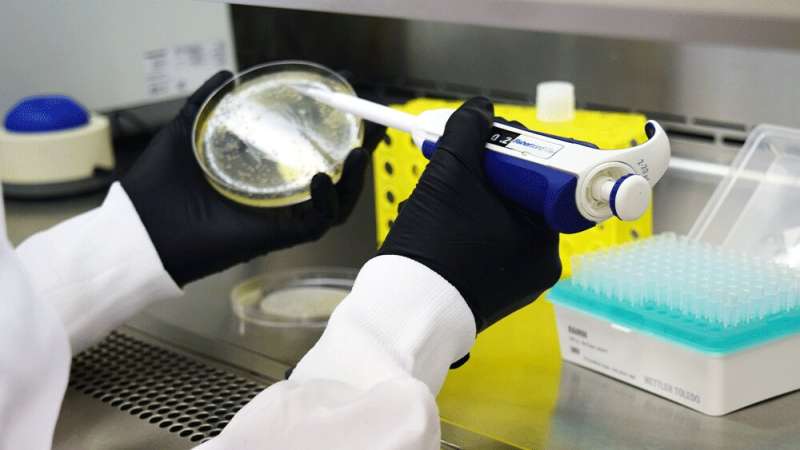Graduate student Huanrong Ouyang picking a single colony of E. coli from a plate to inoculate a liquid culture as part of the process of producing natural benzoxazoles. Credit: Texas A&M Engineering
Whether you are taking a muscle relaxant or a heart medication, you are possibly using a medication that contains a synthetically produced benzoxazole. Although natural benzoxazoles show more significant promise in pharmaceuticals, their time to develop organically and inherent undesired properties impede their usage.
Dr. Xuejun Zhu, assistant professor in the Artie McFerrin Department of Chemical Engineering at Texas A&M University, alongside graduate student Huanrong Ouyang, and two undergraduate students, Joshua Hong and Jeshua Malroy are synthesizing natural benzoxazoles using E. coli in hopes of developing a more efficient, eco-friendly and cost-effective method of producing them for future drug development.
Their research was published in the American Chemical Society's journal ACS Synthetic Biology 2021.
Benzoxazole is a heterocyclic compound composed of carbon, hydrogen, oxygen and nitrogen. It can be produced synthetically but is also found in bioactive natural products like nataxazole, caboxamycin and calcimycin. Synthetically created benzoxazoles are found in synthetic pharmaceuticals ranging from chlorzoxazone (a muscle relaxant) to tafamidis (for treating heart disease).
However, natural benzoxazoles are rarely used because of the time it takes to organically produce the compounds and their unwanted properties, such as high toxicity, low potency and poor solubility. There is limited research on natural benzoxazoles, but they contain many qualities that show potential for future use in cancer, antiparasitic and antimicrobial treatments. For example, some natural benzoxazoles show promising cytotoxic activity that fights against various tumor cell lines.
"Currently, natural methods for producing the compound benzoxazole occur very slowly, sometimes taking a week or longer," said Zhu. "The natural compounds can also cause excess levels of toxicity or other undesired properties that restrict its applications."
Desiring to extract and combat certain qualities of natural benzoxazoles, the researchers turned to the microbe, E. coli—a bacterium found in the environment and within human and animal intestines.
"Compared to other microbes, E. coli grows very quickly," said Ouyang. "Modern researchers have conducted numerous studies on E. coli, and it is easier for us to manipulate genetically for productivity improvement, especially for large-scale production."
The researchers modified an E. coli with a few essential genes for making the natural benzoxazoles. By coupling the engineered E. coli with precursor-directed biosynthesis, a pathway is developed to produce natural benzoxazoles at a faster rate.
"From our study, we found we could produce three different types of benzoxazoles simultaneously," said Zhu. "Each type could have different biological activities such as antimicrobial, antiparasitic and anticancer."
By tailoring variables, such as using different precursors, the researchers can further expand the structural diversity of benzoxazoles with the hope to reverse some of the natural benzoxazoles' inherent issues to improve solubility and potency while lowering toxicity levels.
"We found that our E. coli-based platform can recognize and incorporate selected precursors like fluorine or chlorine into scaffolds," said Ouyang. "Our research serves as a foundation for future drug discovery and development."
With a sustainable way to develop natural benzoxazoles, they could potentially be used in various medications with more benefits than synthetically produced benzoxazoles. The researchers hope this is a step toward a straightforward and cost-effective method of generating novel benzoxazole analogs through protein engineering and combinatorial biosynthesis.
This work is supported by the Texas A&M Engineering Experiment Station and chemical engineering department start-up funds.
More information: Huanrong Ouyang et al, An E. coli-Based Biosynthetic Platform Expands the Structural Diversity of Natural Benzoxazoles, ACS Synthetic Biology (2021). DOI: 10.1021/acssynbio.1c00228
Journal information: ACS Synthetic Biology
Provided by Texas A&M University College of Engineering
























